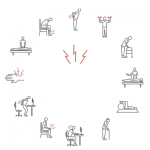The FDA is requiring all benzodiazepines to carry an updated boxed warning that addresses the risks of misuse, abuse and addiction associated with their use.


The FDA is requiring all benzodiazepines to carry an updated boxed warning that addresses the risks of misuse, abuse and addiction associated with their use.

CHICAGO—Although medical treatments for addiction have been proved effective, they are not used often enough, said Kenneth Stoller, MD, during a session at the 2019 ACR State-of-the-Art Clinical Symposium, held April 5–7. These treatments bring health benefits that extend beyond addiction, he said. Dr. Stoller, assistant professor of psychiatry and behavioral sciences at Johns Hopkins…

Treating patients with rheumatic disease for their addictions will also encourage patients to address their overall health conditions, resulting in better medical adherence…

The FDA has designated upadacitinib a breakthrough therapy to treat adults with moderate to severe atopic dermatitis…
Nate Raymond |
(Reuters)—On Tuesday, South Carolina sued Purdue Pharma LP, becoming the latest state or local government to accuse the OxyContin maker of deceptive marketing practices that have contributed to a national opioid addiction epidemic. The lawsuit by South Carolina Attorney General Alan Wilson, filed in Richland County Court of Common Pleas in Columbia, accuses the company…

Opana ER Pulled from U.S. Market Last month, the U.S. Food and Drug Administration (FDA) asked Endo Pharmaceuticals to remove oxymorphone hydrochloride extended release (Opana ER) from the U.S. market due to public health consequences related to abuse. The agency has concerns that the risks presented by the treatment do not outweigh its benefits.1 On…

Larry Beresford |
The alarming statistics on prescription opioid overdoses are well known to medical professionals, thanks to the Centers for Disease Control and Prevention (CDC)’s widely cited finding that deaths from opioid analgesics have increased fourfold since 1999.1 Half of all fatal drug overdoses now involve opioids prescribed by a doctor. Meanwhile, a lack of rigorous research…
Lisa Rapaport |
(Reuters Health)—Scientists are testing an experimental drug that’s designed to have the painkilling power of morphine without some of the side effects that can lead to overdose deaths. Initial results in mice with the compound known for now as PZM21 suggest it might be less addictive than morphine and other opiate painkillers and avoid respiratory…
Andrew M. Seaman |
(Reuters Health)—Seniors who receive prescriptions for opioid drugs to control pain after major surgery don’t usually end up addicted to them, research from Canada shows. One year after having major surgery, less than 1% of patients over age 66 were still taking opioids, according to a report in JAMA Surgery. Recent research has suggested the…
Reuters Staff |
WASHINGTON (Reuters)—A U.S. advisory panel on Thursday recommended approval of Egalet Corp’s long-acting opioid painkiller, Arymo ER (morphine sulfate), saying it dulls pain and could deter abuse by addicts seeking a quick high. The panel recommended that the U.S. Food and Drug Administration (FDA) approve the drug and said it deters, but does not eliminate,…